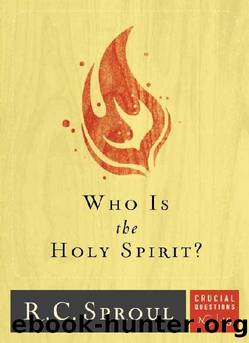Who is the Holy Spirit? (Crucial Questions Series Book 13) by R.C. Sproul

Author:R.C. Sproul [Sproul, R.C.]
Language: eng
Format: epub
Tags: Theology, Christian, Non-fiction
ISBN: 9781567692990
Amazon: 1567692990
Goodreads: 16146805
Publisher: Reformation Trust Publishing
Published: 2012-11-01T06:00:00+00:00
HOSTILITY TO DOCTRINE
Part of our growth in sanctification is growth in our understanding of the things of God. Unfortunately, I have grave concerns about a movement that seems to be sweeping through the Christian world. I find that there is a pervasive indifference and sometimes hostility to the study of doctrine or theology. I have actually heard it said that there are two kinds of people in the church, people who think theology is important and people who do not think it is important. But there was a corollary commentâit was said that people who care about theology are not loving, and that is a problem because God is more concerned that we be loving than that we know theology.
I was deeply distressed when I heard that. Of course, I had heard expressions of antipathy to doctrine before, and I grant that the study of doctrine can lead to a dead orthodoxy that is not godly at all. I think we all know that it is possible to study doctrine as an intellectual exercise and have no love for God or for other people. But it is another matter to generalize this problem and conclude that if we do pursue the study of Christian theology, we absolutely cannot be loving, so the best way to be loving is to avoid theology. Think of the implications of that. Such a conclusion means that the best way to be loving is to avoid as much as we possibly can an understanding of the things of God. The study of theology is simply the study of the character of God, whose crowning virtue is love. Sound theology actually teaches the central importance of love and inclines us to love the God of the Scriptures and other people as well.
Such antipathy to doctrine usually is expressed in the context of a theological controversy. People can get nasty on both sides of theological controversies. But others shy away from all controversy. They often say, âI donât care about this controversy or about doctrine in general, I just think we need to be more loving toward one another.â But is it loving to allow serious theological error to continue unchallenged? Was Paul unloving when he disputed daily in the marketplace about the things of God (Acts 17:17)? Was Jesus unloving when He contradicted the teaching of the Pharisees? Were the prophets of ancient Israel unloving when they rebuked and admonished the false prophets? Was Elijah unloving when he disputed with the prophets of Baal (1 Kings 18)? I cannot imagine someone in the crowd on Mount Carmel that day saying: âYou people can follow Elijah if you want to, but Iâm not going to. He may have truth on his side, but he is not loving. Look what he did to these prophets of Baal. How unloving!â Contending for the truth of God is an act of love, not a sign of an absence of love. If we love God, if we love Christ, if we love the church, we must love the truth that defines the very essence of Christianity.
Download
This site does not store any files on its server. We only index and link to content provided by other sites. Please contact the content providers to delete copyright contents if any and email us, we'll remove relevant links or contents immediately.
What Is the Gospel? (Foreword by D. A. Carson) by Greg Gilbert(989)
Jesus in Me by Anne Graham Lotz(941)
Daily Strength: Devotions for Bible Believing Study by Douglas Stauffer & Andrew Ray & Rick Quatro(896)
Christian Ethics by Wilkens Steve;(854)
The Practice Is the Path by Tias Little(817)
New Morning Mercies by Tripp Paul David(806)
Cleaning Up Your Mental Mess by Dr. Caroline Leaf(738)
Veritas: A Harvard Professor, a Con Man and the Gospel of Jesus's Wife by Ariel Sabar(729)
Greatest Mystery in the World by Og Mandino(666)
The Creative Call by Janice Elsheimer(597)
No More Christian Nice Guy by Paul Coughlin(581)
Our Appointment with Life by Thich Nhat Hanh(571)
Monastic Archaeology by Unknown(564)
2084 by John C. Lennox(556)
This One Wild and Precious Life by Sarah Wilson(542)
Jesus--Awesome Power, Awesome Love (Discover 4 Yourself® Inductive Bible Studies for Kids) by Kay Arthur(534)
The Duties of Parents by J.C. Ryle(515)
The Catholic Verses: 95 Bible Passages That Confound Protestants by Dave Armstrong(511)
The Tale of the Tardy Oxcart (Swindoll Leadership Library) by Swindoll Charles R(500)
